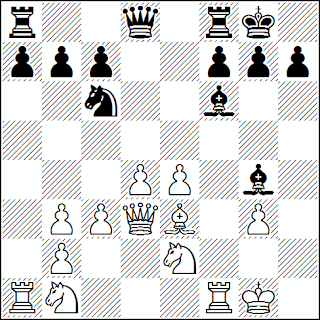Why Chess Will Destroy Your Mind
It turns out that at the area of the reign of chess genius Morphy when chess became very popular in America, the scientific journal Scientific American published a short essay about the uselessness and even harmfulness of the chess game:
“CHESS-PLAYING EXCITEMENT.”
Scientific American, vol. 1, no. 1, 1859, pp. 9–9.
Some quotations from that scientific paper:
As a reply to Clive Thompson, I wrote a post
Chess is Useful in the sense that it is Useless
It is based on Paul Keres's short remark from 1944 concerning weapons, fighting and board games:
“CHESS-PLAYING EXCITEMENT.”
Scientific American, vol. 1, no. 1, 1859, pp. 9–9.
Some quotations from that scientific paper:
... chess is a mere amusement of a very inferior character, which robs the mind of valuable time that might be devoted to nobler acquirements, while at the same time it affords no benefit whatever to the body.
A game of chess does not add a single new fact to the mind; it does not excite a single beautiful thought; nor does it serve a single purpose for polishing and improving the nobler faculties.
Those who are engaged in mental pursuits should avoid a chess-board as they would an adder’s nest, because chess misdirects and exhausts their intellectual energies.
♘♘♘
As a reply to Clive Thompson, I wrote a post
Chess is Useful in the sense that it is Useless
It is based on Paul Keres's short remark from 1944 concerning weapons, fighting and board games:
Paul Keres rarely said anything about politics or real life. However, at the end of World War II, he laconically said that there would be lesser wars if those who like to fight with others would do it harmlessly on the chessboard. I think that maybe Keres had Sigmund Freud’s theory in mind or something like that, I do not know.
Of course, sports as a means to harmlessly express one’s primitive instincts is a kind of justification for it.
However, I do not believe that sports can be used to avoid wars. Those who like the real power and real battle, are despising chess as mere replacement activity.
♘ ♘ ♘
I could not find that quotation of Paul Keres I kept in mind when writing the text above. Perhaps it was only my interpretation of some of his sayings?
However, what I did find is the following quotation (in Estonian):
However, what I did find is the following quotation (in Estonian):
Igas inimeses peitub tahe oma jõudu mõne teisega mõõta, ükskõik millisel kujul see avaldub. Ühed haaravad relvade järele, teised lepivad rusikatega, kolmandad valivad rahulikumaid teid ja siirduvad spordiväljale, neljandad istuvad laua taha ja püüavad teist ületada mõnes mängus.
The original publication was in the newspaper:
Paul Keres, “Noored ja malemäng” [= “Youngs and Chess”], Postimees, 8. March 1944, nr 56, p 4.
It was reprinted in the collection:
Paul Keres, Igavene tuli [= Eternal Check], (Tartu: Ilmamaa, 2006), pp 199–204.
My approximate translation:
Each person has a willingness to measure his strength with others, in whatever form it manifests itself. Some are grabbing weapons, others agree with fists, the third choose a calmer way and move into the sports field, the fourth sit behind the table and try to overcome the other in some games.
— Paul Keres, 1944










